Insanely intense, ‘Wellesley Girl’ questions whether Constitution should be ignored sometimes
 If you’re in the market for an insanely intense play, go see Brendan Pelsue’s Wellesley Girl. It is being performed this weekend and next by students in Stuart Brown’s Florida SouthWestern State College theater department.
If you’re in the market for an insanely intense play, go see Brendan Pelsue’s Wellesley Girl. It is being performed this weekend and next by students in Stuart Brown’s Florida SouthWestern State College theater department.
Pelsue has an ax to grind. He wants us to consider whether there can be an occasion where adherence to the Constitution of the United States and the democratic form of government that it creates should be ignored sometimes in order to obtain 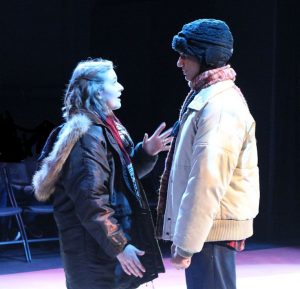 an outcome that protects human life and dignity. But to gain a fair hearing for this proposition, Pelsue understands that he must first liberate us from the prevailing mindset that the Constitution is sacrosanct. So he transports us 447 years into the future.
an outcome that protects human life and dignity. But to gain a fair hearing for this proposition, Pelsue understands that he must first liberate us from the prevailing mindset that the Constitution is sacrosanct. So he transports us 447 years into the future.
Because of an environmental disaster that has rendered the water in the outside world lethal, the United States (and presumably the rest of the world)  has been reduced to pockets of people living in walled enclaves. One of these is located in Massachusetts, and its 445 residents consider themselves the last remnant of our once exceptional nation. In spite of their post-apocalyptic existence and diminished numbers, the U.S. Constitution remains the document by which they conduct their socio-political lives. So much so that every resident is deemed to be a member of Congress except one, and she’s the sole member of the Supreme Court.
has been reduced to pockets of people living in walled enclaves. One of these is located in Massachusetts, and its 445 residents consider themselves the last remnant of our once exceptional nation. In spite of their post-apocalyptic existence and diminished numbers, the U.S. Constitution remains the document by which they conduct their socio-political lives. So much so that every resident is deemed to be a member of Congress except one, and she’s the sole member of the Supreme Court.
As the play opens, 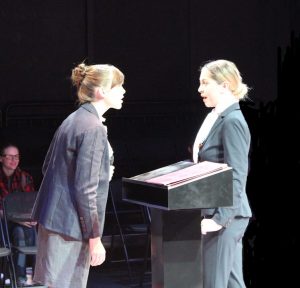 the country faces a new threat. An army from Texas has encamped outside their gates. The Texans consider themselves the rightful heirs to the American way of life, and they demand reparations, back taxes and all of the New Englanders’ children. They are armed with tanks and other artillery and give the town just 48 hours to accede to their demands. Now the New Englanders must decide whether to surrender to the Texans or flee their walled towns and take their chances in the wilderness hoping, after all these years, that the water
the country faces a new threat. An army from Texas has encamped outside their gates. The Texans consider themselves the rightful heirs to the American way of life, and they demand reparations, back taxes and all of the New Englanders’ children. They are armed with tanks and other artillery and give the town just 48 hours to accede to their demands. Now the New Englanders must decide whether to surrender to the Texans or flee their walled towns and take their chances in the wilderness hoping, after all these years, that the water 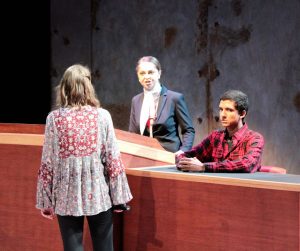 outside is finally safe to drink. To prevent the Texans from pursuing and subjugating them, they’ll launch all of their missiles and scorch the earth where they’d once lived.
outside is finally safe to drink. To prevent the Texans from pursuing and subjugating them, they’ll launch all of their missiles and scorch the earth where they’d once lived.
The debates and concomitant calls to order that precede and follow the Texans’ ultimatum are even more contentious, rancorous and unsettling than those that characterized the Kavanaugh hearings! That’s a bonus for Courtney Sander, 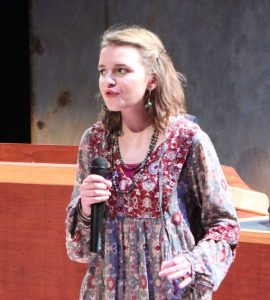 Danica Murray, Avery Wilson and Zan Deboest, who shout, argue and talk over each other in such a chillingly believable way that it conjures comparisons to the indignant exchanges between Lindsey Graham, Ted Cruz, Amy Klobuchar and Kamala Harris.
Danica Murray, Avery Wilson and Zan Deboest, who shout, argue and talk over each other in such a chillingly believable way that it conjures comparisons to the indignant exchanges between Lindsey Graham, Ted Cruz, Amy Klobuchar and Kamala Harris.
Courtney Sander plays the town’s tightly-wound, highly decorous chief executive. Seen last season as the surly, leather-clad Demon Queen, Lilith, in Qui Nguyen’s fantasy romp She Kills Monsters, Sander’s performance in Wellesley Girl is much more nuanced and complex. Although her background and bent is 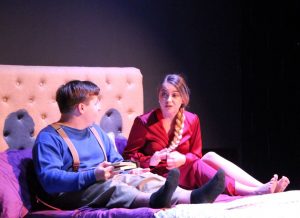 musical theater, Sander has a feel for the dramatic. Trading her double-bladed battle ax for a wooden gavel, she is convincing as a polished politician who demands respect from her colleagues no matter the circumstances. As one might expect, she has no qualms about using a past romantic relationship to parlay support for her political agenda. But it is in her encounters
musical theater, Sander has a feel for the dramatic. Trading her double-bladed battle ax for a wooden gavel, she is convincing as a polished politician who demands respect from her colleagues no matter the circumstances. As one might expect, she has no qualms about using a past romantic relationship to parlay support for her political agenda. But it is in her encounters  with her android husband, Hank, that Sander is at her best – although even there she’s incapable of letting down her hair for very long.
with her android husband, Hank, that Sander is at her best – although even there she’s incapable of letting down her hair for very long.
Avery Wilson plays a naïve and misguided Chair of the Foreign Relations Committee. Her character, RJ, believes there’s a diplomatic solution to every problem, 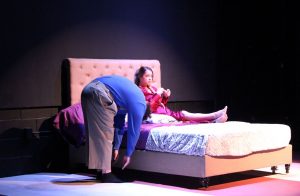 and the scene where she leaves the gates of the walled city waving a tiny American flag as she ventures forth to negotiate with the Texans is as funny as it is poignant. An FSW frosh, Wilson has been seen in Romeo & Juliet at Florida Repertory Theatre and The Curious Incident of the Dog in the Night Time at Cypress Lake High.
and the scene where she leaves the gates of the walled city waving a tiny American flag as she ventures forth to negotiate with the Texans is as funny as it is poignant. An FSW frosh, Wilson has been seen in Romeo & Juliet at Florida Repertory Theatre and The Curious Incident of the Dog in the Night Time at Cypress Lake High.
Zan Deboest 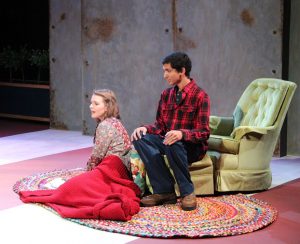 is a stand-out as the hawkish Scott Firebrand, who has neither the time nor temperament for diplomatic solutions. After all, why have a stockpile of missiles if you’re not going to use them? Deboest gives full-throated voice of his character’s fiery outbursts on the floor of the House of Representatives and in the chambers/kitchen of the Supreme Court. However, don’t look for any equivocation or introspection from
is a stand-out as the hawkish Scott Firebrand, who has neither the time nor temperament for diplomatic solutions. After all, why have a stockpile of missiles if you’re not going to use them? Deboest gives full-throated voice of his character’s fiery outbursts on the floor of the House of Representatives and in the chambers/kitchen of the Supreme Court. However, don’t look for any equivocation or introspection from  Deboest’s character. Pelsue uses Scott as a stand-in for all the politicians throughout the history of this country who prefer military action as the first, last and only approach to dealing with perceived foreign threats.
Deboest’s character. Pelsue uses Scott as a stand-in for all the politicians throughout the history of this country who prefer military action as the first, last and only approach to dealing with perceived foreign threats.
Jorge Cabal portrays Max, the man who was romantically involved with Garth for a time but is now married with two children to a woman by the name of Marie. Cabal does a terrific job portraying a man incapable of making decisions without having all of the 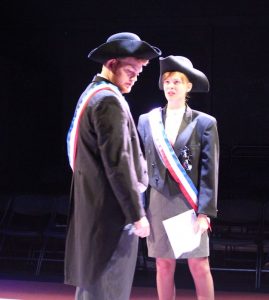 facts that pertain to a problem or potential course of action. It’s not a matter of analysis paralysis. In life’s most nettlesome dilemmas, many facts are simply unknown or unknowable. But in the context of Pelsue’s dystopian play, Max represents all those ambivalent, apathetic people who sit on the sideline regardless of the stakes – whether it’s separating immigrant families, climate change, gun control or the election of the very “representatives” who will introduce the legislation and make the decisions that will govern our lives now and for the foreseeable future. Cabal’s so good in the role
facts that pertain to a problem or potential course of action. It’s not a matter of analysis paralysis. In life’s most nettlesome dilemmas, many facts are simply unknown or unknowable. But in the context of Pelsue’s dystopian play, Max represents all those ambivalent, apathetic people who sit on the sideline regardless of the stakes – whether it’s separating immigrant families, climate change, gun control or the election of the very “representatives” who will introduce the legislation and make the decisions that will govern our lives now and for the foreseeable future. Cabal’s so good in the role 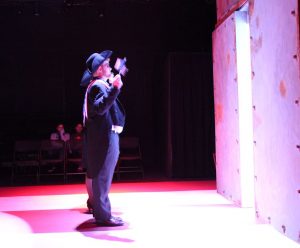 that you’ll want to throttle him almost as much as his on-stage wife, Marie!
that you’ll want to throttle him almost as much as his on-stage wife, Marie!
Danica Murray is wife, mother and Marie, a refugee from the town of Wellesley in which all but of few of the residents died a horrible death after drinking the water following their cessation from the Union several years before the play starts. Murray is truly wonderful in the role, showing a wide range of emotions from anger and frustration to fear, exasperation and 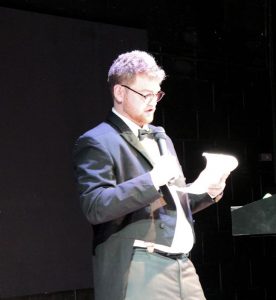 the protectiveness of a mamma bear. Even when she’s not delivering lines, her facial expressions and body language not only belie the emotions her character is experiencing, but contribute to the overall action that’s unfolding across the floor of FSW’s Black Box Theatre. A dual-enrollment student, Murray has her eye on a career in theater. She’s been seen recently in the Florida Rep Conservancy program as Judy Turner in A Chorus Line and, before that, in Heathers the Musical.
the protectiveness of a mamma bear. Even when she’s not delivering lines, her facial expressions and body language not only belie the emotions her character is experiencing, but contribute to the overall action that’s unfolding across the floor of FSW’s Black Box Theatre. A dual-enrollment student, Murray has her eye on a career in theater. She’s been seen recently in the Florida Rep Conservancy program as Judy Turner in A Chorus Line and, before that, in Heathers the Musical.
And then there’s Lexie Anne Cole, a Center for the Arts at 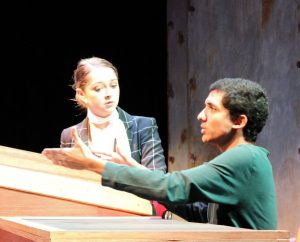 Cypress Lakes High School graduate who made a mark 18 months ago with her performance as Lala Freitag in Lab Theater’s production of the 1997 Tony-winning comedy/drama The Last Night of Ballyhoo. In Wellesley Girl, Cole assumes the role of Supreme Court Chief Justice Donna Landesman, who takes her responsibilities so seriously that she always adds a dissent or two to the rulings she issues on behalf of the High Court.
Cypress Lakes High School graduate who made a mark 18 months ago with her performance as Lala Freitag in Lab Theater’s production of the 1997 Tony-winning comedy/drama The Last Night of Ballyhoo. In Wellesley Girl, Cole assumes the role of Supreme Court Chief Justice Donna Landesman, who takes her responsibilities so seriously that she always adds a dissent or two to the rulings she issues on behalf of the High Court.  In Wellesley Girl, though, she’s a classically tragic figure. She tells Marie in no uncertain terms that when she’s in session, she has no friends. And in her role as the Supreme Court, she is equally callous to the consequences of her actions. Her only concern and loyalty is to giving credence to the U.S. Constitution, precedent and the rule of law.
In Wellesley Girl, though, she’s a classically tragic figure. She tells Marie in no uncertain terms that when she’s in session, she has no friends. And in her role as the Supreme Court, she is equally callous to the consequences of her actions. Her only concern and loyalty is to giving credence to the U.S. Constitution, precedent and the rule of law.
It’s a sentiment postulated in by German philosopher Immanuel Kant in his 1785 polemic Groundwork of the Metaphysics of Morals (in which he advanced the argument that actions are moral only when performed 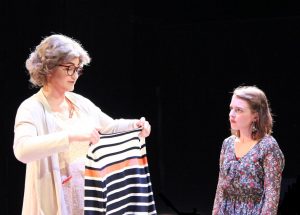 as “duty for duty’s sake”) and summarized in the Bhagavad-Gita in a line spoken by Krishna, who says “Now I become Death, the destroyer of worlds.” Robert Oppenheimer recited the line on the morning of July 16, 1945 as he watched the detonation of the world’s first atomic bomb, and it means that duty is to be undertaken for duty’s sake, without regard or attachment to any potential outcome, which
as “duty for duty’s sake”) and summarized in the Bhagavad-Gita in a line spoken by Krishna, who says “Now I become Death, the destroyer of worlds.” Robert Oppenheimer recited the line on the morning of July 16, 1945 as he watched the detonation of the world’s first atomic bomb, and it means that duty is to be undertaken for duty’s sake, without regard or attachment to any potential outcome, which 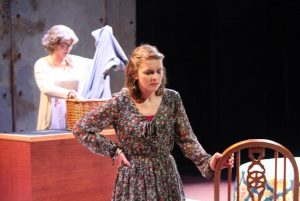 is how Oppenheimer reconciled his role in developing a weapon that could one day lead to mankind’s complete and utter destruction.
is how Oppenheimer reconciled his role in developing a weapon that could one day lead to mankind’s complete and utter destruction.
It’s not clear whether the decision Donna Landesman makes in Wellesley Girl is intended by Pelsue as an indictment of Chief Justice Robert’s 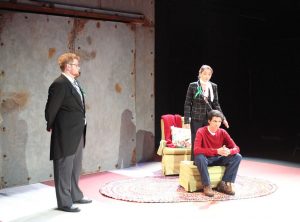 decision in Citizens United or the Court’s landmark decisions in District of Columbia v. Heller and McDonald v. Chicago that perpetuate and even expand an individual’s right to bear arms notwithstanding the carnage playing out daily in our schools, places or worship, clubs and country concerts not to mention the streets of every town and city, including right here in Fort Myers. But it does suggest
decision in Citizens United or the Court’s landmark decisions in District of Columbia v. Heller and McDonald v. Chicago that perpetuate and even expand an individual’s right to bear arms notwithstanding the carnage playing out daily in our schools, places or worship, clubs and country concerts not to mention the streets of every town and city, including right here in Fort Myers. But it does suggest  that there are perhaps occasions when we, as a people, would be better served if the Supreme Court and our politicians gave deference to the human toll associated with their decisions rather over duty, precedent and the rule of law.
that there are perhaps occasions when we, as a people, would be better served if the Supreme Court and our politicians gave deference to the human toll associated with their decisions rather over duty, precedent and the rule of law.
To counterbalance the dark, weighty themes and heavy-handed action rippling through the fabric of this play, Pelsue provides a welcome bit of comic relief in the form of Garth’s robot husband, Hank, ably played by Kole Cox. Hank is not just comical, he’s actually kind of sweet. In a way, he’s every woman’s dream –  a guy who’s sole raison d’etre is to make her happy and provide her with unquestioning, unconditional love and support. And if he doesn’t, all she has to do is slap him across the side of his head to power him down – whether for a moment or the rest of the night is entirely up to her.
a guy who’s sole raison d’etre is to make her happy and provide her with unquestioning, unconditional love and support. And if he doesn’t, all she has to do is slap him across the side of his head to power him down – whether for a moment or the rest of the night is entirely up to her.
The denouement of Wellesley Girl won’t be revealed here. Go see the play and draw your own conclusions about what, exactly, Pelsue is satirizing 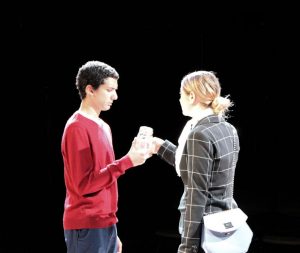 and the message(s) he hopes you’ll derive. There’s some really good work going on in Wellesley Girl and Director Stuart Brown, his eager and talented cast, and the coterie of students providing stage management (Kiana Pinder and Emily Roman), props (Gillian Wilsker), sound design (Krista Carroll), technical support (Chance Cintron and Logan Lewis) and house management (Edlene Francois) all deserve your support and patronage.
and the message(s) he hopes you’ll derive. There’s some really good work going on in Wellesley Girl and Director Stuart Brown, his eager and talented cast, and the coterie of students providing stage management (Kiana Pinder and Emily Roman), props (Gillian Wilsker), sound design (Krista Carroll), technical support (Chance Cintron and Logan Lewis) and house management (Edlene Francois) all deserve your support and patronage.
RELATED POSTS.















 Tom Hall is both an amateur artist and aspiring novelist who writes art quest thrillers. He is in the final stages of completing his debut novel titled "Art Detective," a story that fictionalizes the discovery of the fabled billion-dollar Impressionist collection of Parisian art dealer Josse Bernheim-Jeune, thought by many to have perished during World War II when the collection's hiding place, Castle de Rastignac in southern France, was destroyed by the Wehrmacht in reprisal for attacks made by members of the Resistance operating in the area. A former tax attorney, Tom holds a bachelor's degree as well as both a juris doctorate and masters of laws in taxation from the University of Florida. Tom lives in Estero, Florida with his fiancee, Connie, and their four cats.
Tom Hall is both an amateur artist and aspiring novelist who writes art quest thrillers. He is in the final stages of completing his debut novel titled "Art Detective," a story that fictionalizes the discovery of the fabled billion-dollar Impressionist collection of Parisian art dealer Josse Bernheim-Jeune, thought by many to have perished during World War II when the collection's hiding place, Castle de Rastignac in southern France, was destroyed by the Wehrmacht in reprisal for attacks made by members of the Resistance operating in the area. A former tax attorney, Tom holds a bachelor's degree as well as both a juris doctorate and masters of laws in taxation from the University of Florida. Tom lives in Estero, Florida with his fiancee, Connie, and their four cats.